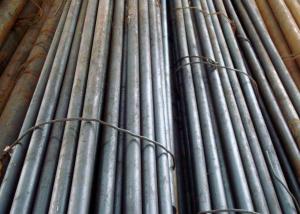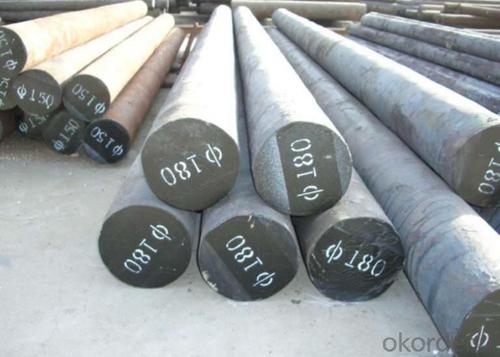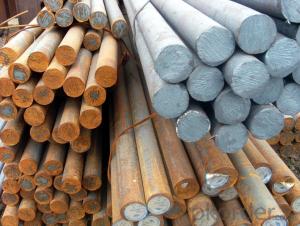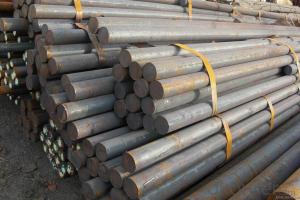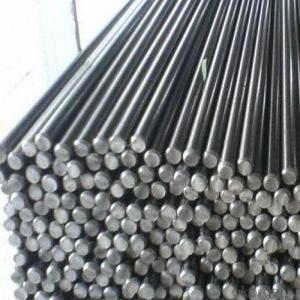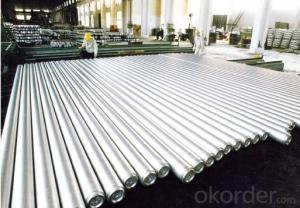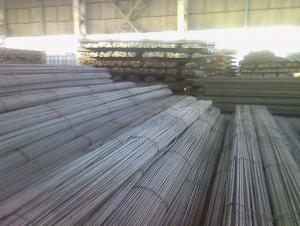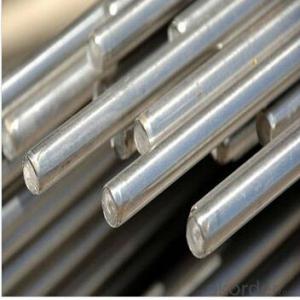Round Steel Spring Bar 60Si2MnA
- Loading Port:
- China Main Port
- Payment Terms:
- TT or LC
- Min Order Qty:
- 50MT m.t.
- Supply Capability:
- 600000TONS/YEAR m.t./month
OKorder Service Pledge
OKorder Financial Service
You Might Also Like
Spring Steel can be divided into two types. One is carbon spring steel, and other one is alloy spring steel.
Alloy spring steel is based on carbon spring steel, by adding one or more alloying elements to improve the mechanical properties, hardenability and other properties to meet the requirement for manufacturing all kinds of spring steel.
Specification of Round Steel Spring Bar:
-Material: 60Si2MnA
-Standard: GB
-Type: Spring Steel
Corresponding Steel Grade for Reference:
CHN, GB | JPN, JIS | GER, DIN | GBR, BS |
60Si2MnA | SUP6/SUP7 | 60SiCr7 | 251H60 |
FRA, NF | USA, AISI/SAE | ISO | |
61SC7 | H2600 | 61SiCr7 |
Chemical Composition:
C | Si | Mn | S |
0.52~0.6 | 1.50~2.00 | 1.00~1.30 | ≤0.035 |
P | Cr | Ni | Cu |
≤0.035 | ≤0.35 | ≤0.35 | ≤0.25 |
V | B | ||
0.08~0.16 | 0.0005~0.0035 |
Mechanical Properties:
-Tensile Strength σb (MPa): ≥1372 (140)
-Yield Strength σs (MPa): ≥1225 (125)
-Elongation δ10(%): ≥5
-Percentage reduction of area: ψ (%): ≥30
-Hardness:
1, Hot rolled, ≤321HB
2, Cold drawn + Heat treatment: ≤321HB
Usage/Applications of Round Steel Spring Bar:
-60Si2MnA contains little alloying elements. Its hardenability is higher than 60Si2Mn. The decarburizing tendency is small and the prime cost is low.
-Products of this material are used as flat spring o spiral spring with diameter less than 30mm that bear a large load during the fabrication of trains, cars and tractors.
Packaging & Delivery of Round Steel Spring Bar:
-Packing Detail: The products can be packed in bundles by steel wires.
-Delivery Detail:
1, Delivery time: 30~45 working days after receive buyer’s T.T. or L/C.
2, Delivery status should be written in the contract. (Heat treatment or no)
Payment:
-Invoicing on theoretical weight or actual weight as customer’s request.
-FOB, CFR or CIF.
-Regular terms of payment:
1, 30% payment in advance, the remaining balance (70% payment) against the copy of B/L. 100% payment before shipment.
2, 30% payment in advance, the remaining balance (70% L/C) against the copy of B/L. 100% payment before shipment.
3, Negotiable.
Photos of Round Steel Spring Bar:
-Round Steel Spring Bar 1:
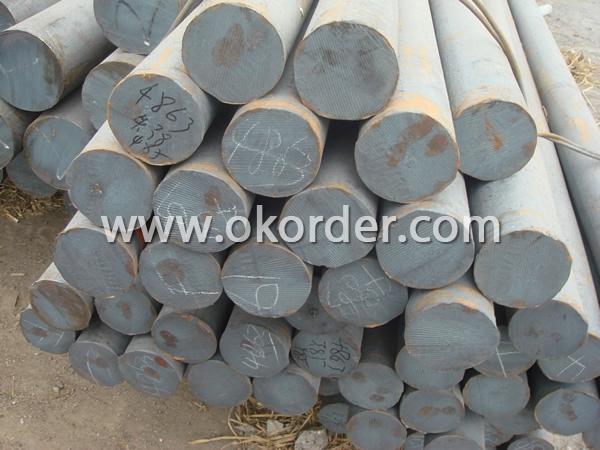
-Round Steel Spring Bar 2:
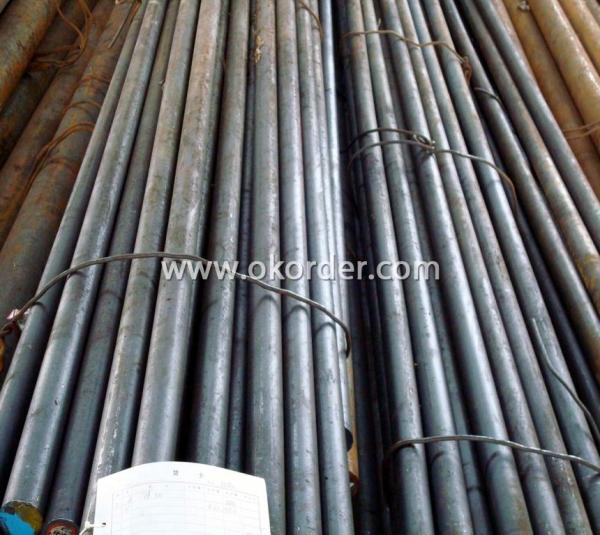
-Round Steel Spring Bar in the factory:
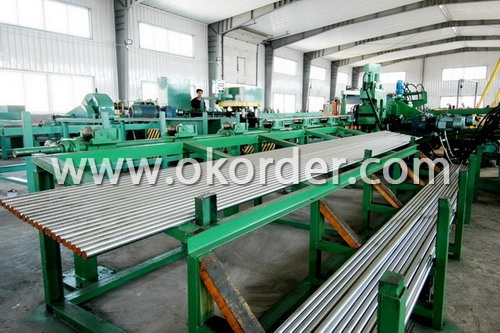
- Q: How does special steel contribute to the power generation industry?
- Special steel plays a crucial role in the power generation industry by offering high strength, durability, and resistance to extreme temperatures and corrosive environments. It is used in the construction of power plant components such as turbines, generators, boilers, and heat exchangers, ensuring efficient and reliable operation. Additionally, special steel enables the development of advanced technologies such as supercritical and ultra-supercritical power plants, which enhance energy efficiency and reduce emissions, contributing to a more sustainable power generation.
- Q: Can special steel be used in the manufacturing of tools?
- Yes, special steel can be used in the manufacturing of tools. Special steels, such as high-speed steel, tool steel, and alloy steel, are specifically designed to have exceptional strength, hardness, and durability properties. These characteristics make special steel ideal for tool manufacturing, as it can withstand high temperatures, resist wear and corrosion, and provide the necessary toughness required for various cutting, shaping, and drilling applications.
- Q: How does special steel contribute to the chemical industry?
- Special steel contributes to the chemical industry by providing key materials for various applications. It is used in the construction of chemical processing equipment, such as reactors, heat exchangers, and storage tanks, due to its corrosion resistance and high strength. Special steel alloys can withstand harsh chemical environments, ensuring safety and durability in chemical operations. Additionally, special steel is utilized for manufacturing catalysts, which play a crucial role in catalytic reactions and chemical synthesis processes. Overall, special steel enhances the efficiency, reliability, and performance of equipment and catalysts in the chemical industry.
- Q: What are the different heat treatment processes for special steel?
- There are several different heat treatment processes for special steel, including annealing, quenching, tempering, case hardening, and precipitation hardening.
- Q: What are the different methods for improving the fatigue strength of special steel?
- There are various ways to enhance the fatigue strength of special steel: 1. Heat treatment is a commonly used approach, involving processes like annealing, quenching, and tempering. These treatments refine the steel's microstructure, reduce impurities, and boost fatigue resistance. 2. Surface treatments, such as shot peening and nitriding, can also enhance fatigue strength. Shot peening bombards the steel surface with small metal particles, inducing compression stress that prevents crack formation and propagation. Nitriding diffuses nitrogen into the surface layer, creating a hard and wear-resistant nitride layer that improves fatigue resistance. 3. Alloying special steel with specific elements, like chromium, molybdenum, or vanadium, can significantly improve fatigue strength. These elements form carbides or nitrides, acting as barriers against crack propagation. 4. Applying protective surface coatings, like electroplating, hot-dip galvanizing, or physical vapor deposition (PVD), can enhance fatigue strength. These coatings act as barriers against environmental factors that may cause corrosion or surface damage, ultimately extending the steel's fatigue life. 5. Grain refinement can be achieved through processes like severe plastic deformation or equal channel angular pressing (ECAP). By refining the grain size, the steel's fatigue strength can be improved, as fine-grained steels have higher resistance to crack initiation and propagation. 6. Residual stress management plays a crucial role in enhancing fatigue strength. Techniques like stress relieving or shot peening can reduce tensile residual stresses, which are detrimental to fatigue resistance. It's important to consider specific requirements, the type of special steel, and the intended application when selecting the most suitable method for improving fatigue strength.
- Q: How does special steel contribute to sustainable development?
- Special steel contributes to sustainable development in several ways. Firstly, it is a highly durable and long-lasting material, which means that products made from special steel have a longer lifespan and require fewer replacements. This reduces the overall consumption of resources and decreases waste generation. Secondly, special steel is often used in energy-efficient applications, such as renewable energy infrastructure and energy-efficient transportation. These applications help reduce greenhouse gas emissions and contribute to the transition to a low-carbon economy. Lastly, the production of special steel involves continuous improvements in energy efficiency, waste reduction, and recycling. This helps minimize the environmental impact of the steel industry and promotes more sustainable manufacturing practices.
- Q: What are the main factors affecting the creep rupture strength of special steel?
- The main factors affecting the creep rupture strength of special steel are the material composition, grain size, temperature, applied stress, and time.
- Q: How long does special steel last compared to regular steel?
- Due to its unique composition and properties, special steel tends to have a longer lifespan than regular steel. Regular steel primarily consists of iron and carbon, while special steel is alloyed with elements like chromium, nickel, and molybdenum to enhance its strength, hardness, and resistance to corrosion. The lifespan of special steel is influenced by factors such as the specific type of steel, its usage conditions, and maintenance practices. However, in general, special steel has a significantly longer lifespan compared to regular steel. It exhibits greater resistance to wear and tear, corrosion, and high temperatures, making it suitable for demanding applications and environments. Industries such as aerospace, automotive, and construction extensively utilize special steel for critical components like engine parts, structural elements, and cutting tools. These components often endure high stress, friction, and exposure to harsh conditions. Special steel's exceptional properties enable it to withstand these challenges and maintain its performance for an extended period. Furthermore, special steel undergoes rigorous testing and quality control measures during its manufacturing process. This ensures that it meets specific industry standards and can endure extreme conditions without significant degradation. In contrast, regular steel may not possess the same level of durability or longevity. In conclusion, special steel generally lasts longer than regular steel due to its enhanced properties and resistance to wear, corrosion, and high temperatures. Although the exact lifespan may vary depending on various factors, special steel's superior characteristics contribute to its prolonged durability.
- Q: How does special steel contribute to the chemical resistance of products?
- Special steel contributes to the chemical resistance of products by offering enhanced corrosion resistance properties due to its unique composition and manufacturing process. It contains alloying elements such as chromium and nickel, which form a protective oxide layer on the surface that prevents the steel from reacting with corrosive substances. This makes special steel highly resistant to acids, alkalis, and other chemicals, ensuring the longevity and reliability of products in various industries.
- Q: What are the cutting tools used for machining special steel?
- The cutting tools commonly used for machining special steel include carbide inserts, high-speed steel (HSS) drills, end mills, and broaches. These tools are specifically designed to withstand the high temperatures and hardness of special steels, ensuring precise and efficient cutting operations.
1. Manufacturer Overview
| Location | Jiangsu, China |
| Year Established | 2003 |
| Annual Output Value | Above US$ 30 Million |
| Main Markets | Asia-Pacific; Middle east |
| Company Certifications |
2. Manufacturer Certificates
| a) Certification Name | |
| Range | |
| Reference | |
| Validity Period |
3. Manufacturer Capability
| a) Trade Capacity | |
| Nearest Port | Shanghai. |
| Export Percentage | 20% - 30% |
| No.of Employees in Trade Department | 10-20 People |
| Language Spoken: | English; Chinese |
| b) Factory Information | |
| Factory Size: | Above 100,000 square meters |
| No. of Production Lines | 2 |
| Contract Manufacturing | OEM Service Offered; |
| Product Price Range | Average |
Send your message to us
Round Steel Spring Bar 60Si2MnA
- Loading Port:
- China Main Port
- Payment Terms:
- TT or LC
- Min Order Qty:
- 50MT m.t.
- Supply Capability:
- 600000TONS/YEAR m.t./month
OKorder Service Pledge
OKorder Financial Service
Similar products
Hot products
Hot Searches
Related keywords

